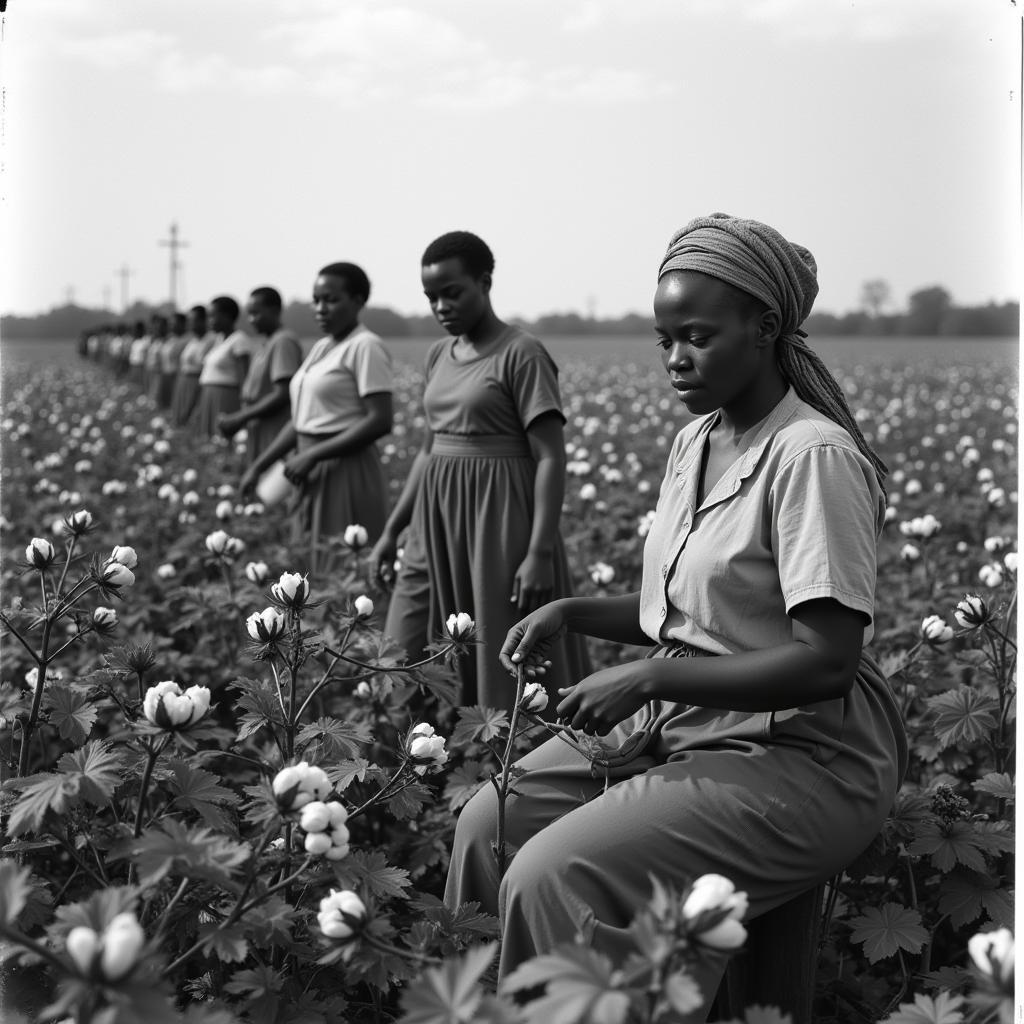The Untold Strength of African American Women During Slavery
The lives of African American Women During Slavery were marked by unimaginable hardship and brutality. This period, spanning centuries, saw these women stripped of their freedom, subjected to forced labor, and denied basic human rights. However, within this horrific system, they found ways to resist, build community, and leave an indelible mark on history.
 African American Women Working Cotton Fields
African American Women Working Cotton Fields
More Than Labor: The Multifaceted Roles of Enslaved Women
While often depicted solely as field workers, enslaved women performed a wide range of tasks. They cooked, cleaned, sewed, nursed children, and cared for the elderly, both within their own families and for their enslavers. Their skills and labor were vital to the functioning of plantations and the Southern economy as a whole.
 African American Woman Caring for Child
African American Woman Caring for Child
Family and Community: Sources of Strength and Resistance
Family and community were essential to the survival of enslaved people. Despite the constant threat of separation through sale or inheritance, they formed strong kinship bonds, often creating surrogate family networks when biological ties were broken. These communities provided emotional support, shared cultural traditions, and fostered resistance.
Forms of Resistance: From Subtle Acts to Open Rebellion
Resistance took many forms. Women sometimes slowed down work, broke tools, or feigned illness. They passed down knowledge and traditions to their children, ensuring the survival of their culture. Some women, like Harriet Tubman, bravely escaped and risked their lives to help others find freedom through the Underground Railroad.
Legacy of Strength: African American Women Shaping a Nation
The strength and resilience of African American women during slavery laid the foundation for future generations of activism and social change. Their contributions, both seen and unseen, were instrumental in the fight for abolition and continue to inspire struggles for equality today. Remembering their stories means acknowledging the horrors they endured while celebrating their enduring spirit and contributions to American history.
 African American Women Gathering Secretly
African American Women Gathering Secretly
FAQs
What types of work did enslaved women do besides working in the fields?
Enslaved women performed a wide range of tasks beyond fieldwork, including cooking, cleaning, sewing, childcare, and caring for the elderly, both for their own families and for their enslavers.
How did enslaved women resist slavery?
Resistance took many forms, ranging from subtle acts like slowing down work or breaking tools to more overt actions like running away or participating in rebellions. They also preserved their culture and built community as forms of resistance.
How did the experience of slavery differ for women?
In addition to the hardships faced by all enslaved people, women also endured unique forms of abuse and exploitation. They were vulnerable to sexual violence and faced the constant threat of having their children sold away from them.
What is the legacy of African American women during slavery?
The strength, resilience, and resistance of these women laid the foundation for future generations of activism and social change. Their stories continue to inspire the ongoing fight for racial justice and equality.
Where can I learn more about the experiences of African American women during slavery?
There are numerous books, documentaries, and online resources dedicated to this topic. Some valuable starting points include African American Women Haircuts, African American Historical Figures, and African American Clothing History, which offer different perspectives on their lives and legacies.
Need more support? Contact us at +255768904061, email kaka.mag@gmail.com, or visit us at Mbarali DC Mawindi, Kangaga, Tanzania. Our customer support team is available 24/7.
